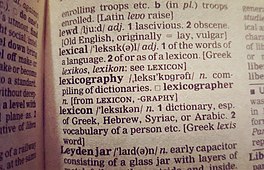Documentation:RelLex/Elementary Bilingual Dictionary English-Lakhóta Lakhóta-English
Elementary Bilingual Dictionary English-Lakhóta Lakhóta-English
| Relational Lexicography Knowledgebase | |
|---|---|

| |
| About RelLex | |
| An index of under-resourced North American language references, including print and digital dictionaries. | |
| Browse by | |
| About the Knowledgebase | |
| Find our filterable Knowledgebase of dictionaries and lexicography technology at https://knowledgebase.arts.ubc.ca/. | |
Language Name
Lakota.
Alternate Language Names
Lakȟótiyapi, Lakhota, Lakhóta, Teton, Teton Sioux.
Region
Alberta, Saskatchewan, Manitoba, and Ontario, Canada; Montana, Wyoming, Colorado, North Dakota, South Dakota, Nebraska, Kansas, Oklahoma, Texas, Minnesota, and Iowa, United States.
Who
The CU Lakhóta Project.
Others Involved
David Rood (Project Lead); The National Endowment for the Humanities (Funding).
There is no other information included in this dictionary about others involved.
Publishing Information
This dictionary was published in 1976 by University of Colorado Lakhóta Project, Boulder, Colorado.
How People are Cited
This dictionary does not cite any authors or contributors.
David Rood is cited on the University of Colorado Boulder Department of Linguistics Lakhóta Learning Materials website. The funding information is cited on the dictionary's cover page.
How Information is Cited
This dictionary does not cite the source of any of its information.
Where is Information Coming from
This dictionary does not indicate where information is coming from or what sources were used.
Tools and Framework used
This dictionary is available as a physical and digital book.
Access
The physical book is accessible through libraries. The digital version of this dictionary is open access through the University of Colorado Boulder Department of Linguistics Lakhóta Learning Materials website.
Included Languages and Directionality
English to Lakota; Lakota to English.
Dialects Included
This dictionary includes information from the Oglala and Brule (Sicangu) dialects of Lakota.
Type of Dictionary
This is a bilingual, bidirectional dictionary.
How are Entries Organised
Entries are organized alphabetically by either English or Lakota, depending on the directionality of the particular section. Entries include the headword (in either English or Lakota) and the translation(s) or definition(s). In English-Lakota entries where there are several disparate translations or definitions, the entry is subdivided into sections. In the Lakota-English section, these disparate translations are listed as their own entries. In both sections, most entries include sentence examples. Verbal entries include conjugated forms. Entries may also include a literal translation of the Lakota headword/translation, cross references, secondary meanings, and culturally relevant information on word usage.
The dictionary's preface includes information on Lakota orthography and spelling conventions, stress and pronunciation, sound system, and expressions, followed by a brief explanation about why the vocabulary included in the dictionary was chosen.
Other Features
| Feature | Included | More Information |
|---|---|---|
| Guide to use and understand | ✅ | Under the heading Format of Entries, starting on p. xv |
| Audio | ❌ | |
| Images | ❌ | |
| Example phrases | ✅ | In most entries in both sections |
| Speakers marked | ❌ | |
| Dialects marked | ❌ |
Other Notes
This dictionary was prepared as one part of the teaching materials produced by the language project. "The other materials are an introductory teaching grammar (20 lessons), an intermediate teaching grammar (10 lessons), and an elementary reader" (p. i).
External Links
Reference on WorldCat: https://search.worldcat.org/title/823508851
Direct access to the open access digital version hosted by the University of Colorado Boulder Department of Linguistics: https://www.colorado.edu/linguistics/sites/default/files/attached-files/lakhota_dictionary_0.pdf
Find a link to the dictionary along with the other Lakota learning materials developed by the CU Lakhóta Project on the University of Colorado Boulder Department of Linguistics website: https://www.colorado.edu/linguistics/research/language-documentation/lakhota-learning-materials#:~:text=These%20are%20scanned%20versions%20of,in%20learning%20or%20teaching%20Lakhóta.